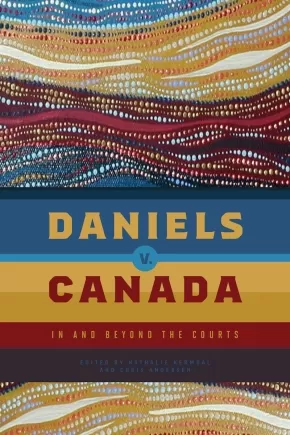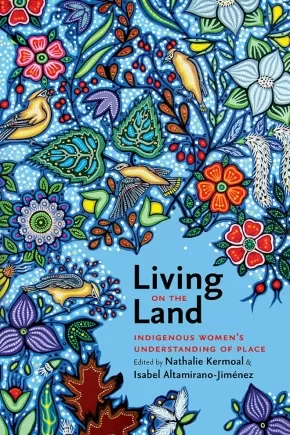Nathalie Kermoal
Nathalie Kermoal is a professor in the Faculty of Native Studies at the University of Alberta and Director of Rupertsland Centre for Métis Research.
Books (2)
Synopsis:
In Daniels v. Canada the Supreme Court determined that Métis and non-status Indians were “Indians” under section 91(24) of the Constitution Act, 1867, one of a number of court victories that has powerfully shaped Métis relationships with the federal government.
However, the decision (and the case) continues to reverberate far beyond its immediate policy implications. Bringing together scholars and practitioners from a wide array of professional contexts, this volume demonstrates the power of Supreme Court of Canada cases to directly and indirectly shape our conversations about and conceptions of what Indigeneity is, what its boundaries are, and what Canadians believe Indigenous peoples are “owed.”
Attention to Daniels v. Canada’s variegated impacts also demonstrates the extent to which the power of the courts extend and refract far deeper and into a much wider array of social arenas than we often give them credit for. This volume demonstrates the importance of understanding “law” beyond its jurisprudential manifestations, but it also points to the central importance of respecting the power of court cases in how law is carried out in a liberal nation-state such as Canada.
Reviews
"This important collection of original pieces focusing on Daniel’s v. Canada and the Supreme Court’s decision will have an impact for years to come. Reader’s will appreciate the diverse areas of expertise found in this volume, including Indigenous leadership, political activism, sociology, law, and anthropology." — Christopher Adams
“Articulate, thoughtful, provocative assessments of how we might assess the Supreme Court’s 2016 decision regarding the Metis People’s legal status in Canada.” — William Craig Wicken
Educator Information
Other contributors: Tony Belcourt, Catherine Bell, Deborah A. Bolnick, Brenda L. Gunn, Arend J.A. Hoekstra, Thomas Isaac, Darryl Leroux, Jason Madden, Brenda Macdougall, Austin W. Reynolds, Rick W.A. Smith, Lauren Springs, D’Arcy Vermette
Table of Contents
Introduction
Ch. 1—Daniels in Context
Ch. 2—Harry Daniels and Section 91 (24) of the British North America Act
Ch. 3—After the Hysteria: Understanding Daniels v. Canada from a Métis Nation Perspective
Ch. 4—Daniels v Canada: A Framework for Redress
Ch. 5—The Other Declarations in Daniels: Fiduciary Obligations and the Duty to Negotiate
Ch. 4—Racism, Canadian Jurisprudence, and the de-Peopling of the Métis in Daniels
Ch. 5—Daniels Through an International Law Lens
Ch. 6—Daniels v. Canada Beyond Jurisprudential Interpretation: What to do Once the Horse has Left the Barn
Ch. 7—Outlining the Origins of “Eastern métis” Studies
Ch. 8—Making Kin in a Postgenomic World: Indigenous Belonging after the Genome
Ch. 9—How We Know Who We Are: Historical Literacy, Kinscapes, and Defining a People
Conclusion: The Multiple Lives of the Daniels Case
Additional Information
336 pages | 6.00" x 9.00" | index, bibliography
Synopsis:
An extensive body of literature on Indigenous knowledge and ways of knowing has been written since the 1980s. This research has for the most part been conducted by scholars operating within Western epistemological frameworks that tend not only to deny the subjectivity of knowledge but also to privilege masculine authority. As a result, the information gathered predominantly reflects the types of knowledge traditionally held by men, yielding a perspective that is at once gendered and incomplete. Even those academics, communities, and governments interested in consulting with Indigenous peoples for the purposes of planning, monitoring, and managing land use have largely ignored the knowledge traditionally produced, preserved, and transmitted by Indigenous women. While this omission reflects patriarchal assumptions, it may also be the result of the reductionist tendencies of researchers, who have attempted to organize Indigenous knowledge so as to align it with Western scientific categories, and of policy makers, who have sought to deploy such knowledge in the service of external priorities. Such efforts to apply Indigenous knowledge have had the effect of abstracting this knowledge from place as well as from the world view and community—and by extension the gender—to which it is inextricably connected. Living on the Land examines how patriarchy, gender, and colonialism have shaped the experiences of Indigenous women as both knowers and producers of knowledge. From a variety of methodological perspectives, contributors to the volume explore the nature and scope of Indigenous women’s knowledge, its rootedness in relationships both human and spiritual, and its inseparability from land and landscape. From the reconstruction of cultural and ecological heritage by Naskapi women in Québec to the medical expertise of Métis women in western Canada to the mapping and securing of land rights in Nicaragua, Living on the Land focuses on the integral role of women as stewards of the land and governors of the community. Together, these contributions point to a distinctive set of challenges and possibilities for Indigenous women and their communities.
Additional Information
240 pages | 6.00" x 9.00" | Paperback








